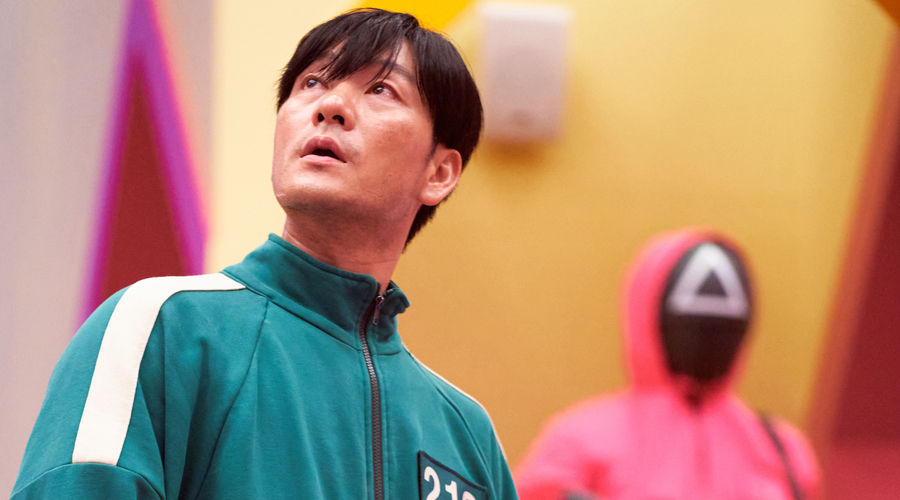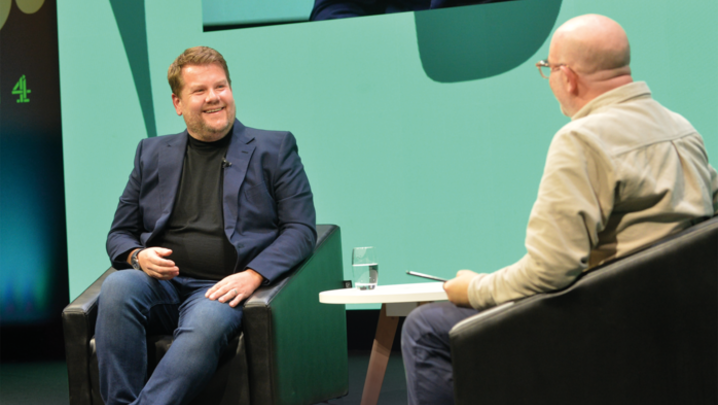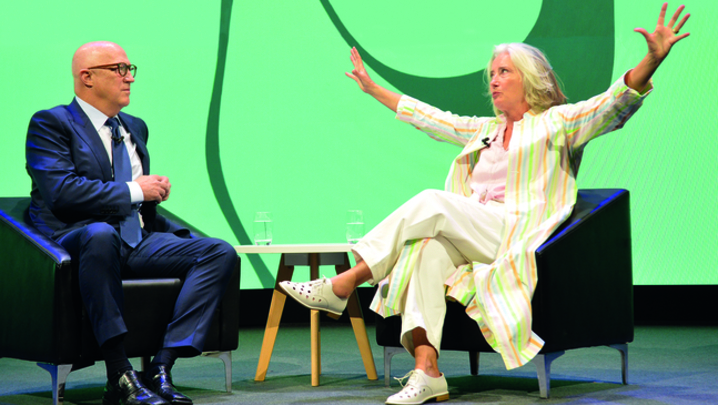Squid Game’s huge popularity is boosting Netflix but Shilpa Ganatra believes its success should not have come as such a surprise.
When Hwang Dong-hyuk’s Squid Game launched on 17 September, for viewers outside its algorithmic pull, it was buried deep within Netflix’s content offer. But, over the next four weeks, this idiosyncratic show snowballed to reach 142 million households (there’s a viewership figure that Netflix didn’t mind sharing), overtaking Bridgerton to become the stream- er’s most-watched series launch ever.
By some estimates, this show alone will be worth $900m (£666m) to Netlix. An eye-watering sum for any producer – and that was before the streamer confirmed in early November that it was ordering a second season. It may seem like an unexpected hit, but could this runaway success have been predicted?
“From an editor’s point of view, it is often mystifying which shows become popular,” says Hannah Davies, The Guardian’s deputy TV editor. “Sports comedies don’t always do that well but now people are calling Ted Lasso the most joyous show on TV.
“Maid, the recent Netflix series that, on first impressions, potentially borders on poverty porn, really captured viewers’ imaginations. Squid Game, too, seems to have all the elements for a perfect storm.”
While no one could have foretold the extent of Squid Game’s culture- shifting appeal, the elements that led to this “perfect storm” were gathering from the start.
If content is king, the reason behind Squid Game’s success is ultimately its compelling story of a disparate and desperate group of down-and-outs in deep financial trouble, who compete to the death in children’s games to win a life-changing jackpot.

“It’s Hunger Games meets La Casa de Papel [Money Heist] meets Survivor meets Grand Theft Auto meets Crackerjack!,” says Andy Harries, CEO of Left Bank Pictures, which makes The Crown for Netflix. “Despite all the familiar tropes from a range of different experiences, it is a very original series in its own right.”
Its themes resonate loudly in 2021. Like Maid, it highlights the human cost of a widening class divide. And just when we thought competitive reality shows had nowhere left to go, their tropes are given a grotesque twist in Squid Game and prove to be just as compelling.
The show’s emotional heart is another boon, says Jane Tranter, co-founder of Bad Wolf and executive producer on Succession. “What they are going through is so horrendous, and the piece so very firmly places you in it, asking, ‘What would you do?’
“Once you get to this situation, what is the right and wrong? Everyone wants to live. Everyone’s frightened of dying. Sometimes, life is so horrendous that you’ll make a bolder stand than you would have done otherwise. It showed great compassion and mercy in a format that was absolutely devoid of that.”
There’s no denying that Korea’s emerging role as a cultural powerhouse helped the series to gain momentum. K-pop came first, with acts such as Blackpink and BTS becoming some of the biggest names in pop globally. And once Bong Joon-ho’s horror movie Parasite became the first non-English language film to win Best Picture at the Oscars in February 2020, it became clear that Korea was a hotbed of talent. Not, of course, forgetting the global phenomenon that was The Masked Singer.
But it required deep pockets and far-reaching connections to turn the country’s creative potential to success on western screens. Enter Netflix. Alongside such “K-drama” successes as Sweet Home and Kingdom in 2020 alone, Netflix pumped $500m into Korean original programming – a staggering figure that was likely to pay dividends at some point.
“This is not a cheap little show that has popped up out of nowhere,” says Harries. “It’s a bit like The Crown. Although we could have made a success of The Crown elsewhere, we wouldn’t have been able to do it the way we did if we hadn’t gone to Netflix.
“Hwang would have said to Netflix that he could do Squid Game for two bob, but it wouldn’t really work, and Netflix had the guts, I assume, to agree to do it properly. Then, because they’ve done it properly, it really works.”
Subtitled in 37 languages and dubbed in 34, it appeared on our screens primed for a global viewership. The series’s $21.4m budget allowed for a premium production, including the vast swathes of uniformed guards that, as Harries points out, evoke the chilling imagery of fascism. And the money supported a bold set design, striking in its juxtaposition of playground visuals with its twisted premise and gory violence.
“It’s such a singular, recognisable proposition and it became very meme-worthy,” says Davies. “It has this rich stream of things that took off quickly on TikTok and Instagram. I remember seeing the tracksuits, logo, symbols and honeycomb before I’d even watched it. That’s not something that every show on TV can replicate, and it keeps it in the cultural conversation.”
That in itself made it easier to build coverage in traditional media. “When something grows organically, it makes a journalist’s job more interesting,” says Davies. “At The Guardian, we could do things like interview the creator who said that he lost six teeth in the process, interview the VIPs and we did a piece on whether the subtitles were actually accurate. Sometimes, letting things just percolate isn’t the worst thing in the world.”
Squid Game’s appeal also relates to the structure of the series. Tranter says: “I liked not having to wait a week between the episodes, but I got a lot watching it on a Monday, thinking about it, and then watching it the following evening. It had a very cliffhangery, old-fashioned, highly serialised element to it.
“You don’t often talk about formats in this way with a drama, but, because it’s a competition reality show, where the stakes are the highest they could be, you know at the end there will be one winner. You know by the amount of screen time who are going to be the last ones standing, but you don’t know the particular combination of it, or how or why.”
While it wasn’t perfect – Tranter calls the bluntly drawn depiction of the VIPs “impactfully disappointing” – all in all, Squid Game may show us the direction of travel for TV drama. For starters, there seems to be a stronger stomach for gore and violence. Additionally, watching subtitled shows is no longer the reserve of arthouse programmes.
“It doesn’t spearhead it, but it confirms the pattern of increasing success with drama shows that aren’t from the US,” adds Harries. “Lupin from France, Barbarians from Germany and The Crown and Succession, which is largely a British show, provide further evidence.
“The mediocrity of a great number of American shows is being exposed a bit. When American shows are good, they’re really good. But, given the amount of American shows that go on Netflix every week, it’s interesting that the ones that are cutting through are often non-American shows.”
While some may see Squid Game as the start of a “death-game drama” resurrection, Davies warns that “people don’t necessarily want Squid Game copy and paste”.
For Tranter, the contained, sparse set that went against the grain of current productions piqued her interest. “It put the nature of the human condition under the microscope in a heightened way. If a good trend could come out of it, it would be about simplifying a production, and allowing it to be all about text and performance.”
Does the expansion of global competition mean that British dramatists should be worried? Not according to Harries. “Any competition is healthy,” he says. “In terms of coming up with original ideas, we’ve got to remain fresh and up to the challenge because there’s no doubt that you’re seeing shows from all over the world pop up with great success.
“But we’ve got some of the best people in the world making television here, so we’re always going to produce strong work.”







